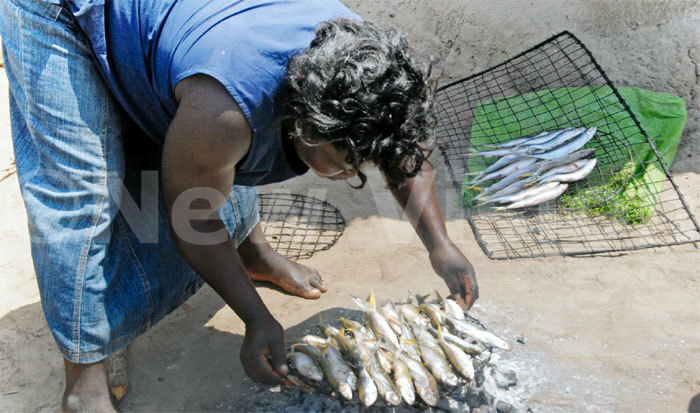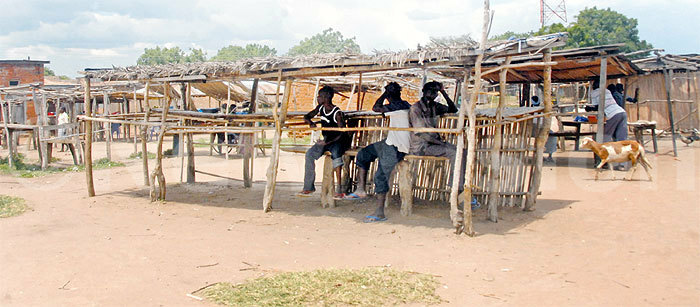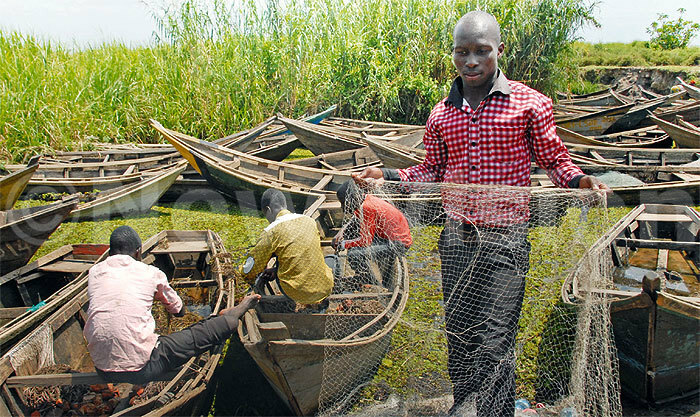Fishing villages suffer as fish catch drops, industries crash
Wanseko is fast collapsing into a ghost village. The animated spirit of the fishing community has been dampened.
PIC: Residents fetching water and washing utensils and a bicycle in a fish breeding area in Wanseko on Lake Albert. Such activities are degrading the lake, which gradually affects the fish stocks. (Credit: Pascal Kwesiga)
Fish stocks from lakes in East Africa have dropped to a level that has not been witnessed in many years. As a result, fish factories are closing while the economic activity in fishing villages has drastically contracted. Pascal Kwesiga visited Wansenko fishing village in Buliisa district and sheds some light on the situation.
our years ago, Pearl Lodge and Bar in Wanseko fishing village, Buliisa district, was a hub of activity. Music blared throughout the evenings. The bar served tens of crates of beer every day. Business was good and Patrick Lumumba, the proprietor, would turn some clients away.
Today, however, it is a ghost of its old self. Lumumba, 60, sits alone outside the bar on a Thursday evening. His left hand under his chin, he strikes you as a man in deep thought. Inside his bar, the beer crates and bottles are caked in dust. Most of the 14 rooms at the lodge have not been opened for days.
"I have not restocked beers in a long time because there are no customers. I do not even get a single client looking for accommodation," Lumumba said.
Four years ago, Wanseko fishing village, on the shores of Lake Albert, was bustling with activity, teeming with fishermen, fish traders, travellers and food vendors.
At a makeshift market located a short distance away from the lake's shoreline, stalls were bursting with fish.
The Uganda National Roads Authority ferry frequently sailed across the lake, moving passengers, including traders, between Wanseko and Panyimur, another fishing village on the other side of the lake in Nebbi district.
All the rooms at Pearl Lodge and Bar would be occupied by clients every night, with each room being rented out at sh10,000 per night. Entertainment places remained open all night long, with exuberant revellers drinking and dancing.
Lumumba had employed three people to help him in running the bar and the lodge. All this has changed.
A ghost town
Wanseko is fast collapsing into a ghost village. The animated spirit of the fishing community has been dampened. The population that thrived on trade in fish has noticeably gone down.
The stalls in the makeshift market are empty, with a few vendors selling items such as tomatoes and beans. The once fish market stalls are on the verge of collapse.
"I used to earn about sh15,000 daily from the sale of food items in the market, but today, I hardly earn sh3,000," Grace Ntakimanye, 30, a food vendor, said.
It no longer makes economic sense to run a business in Wanseko because the people living in the area have low purchasing power.
"People no longer buy items like clothes as they did in the past. They only buy food items like posho and beans," Businge Nkumire, a general merchandise shop owner in Wanseko, said.
Lumumba let go of the three people he had hired in 2014. Today, he runs his business alone.
"I did not have the money to pay workers since there are no clients. If there is no fish in the lake, there is no business," he said.
It is not only Lumumba's and Nkumire's businesses that have been affected, but every facet of life. Other fishing villages around Lake Albert are also affected.
There are over 30 fishing villages around Lake Albert in Hoima, nine in Kibaale, nine in Buliisa, five in Nebbi and nine in Ntoroko districts that share the water body.
"Previously, I would earn about sh20,000 daily and give the owner of the motorcycle sh10,000. Today, it is difficult to earn sh5,000 because there are few people in Wanseko," Moses Wandera, a bodaboda cyclist, said.

A woman roasting immature fish in Wanseko on Lake Albert
Some of the commuter taxis that previously ferried people frequently between Hoima, another riparian district on Lake Albert, and Wanseko, have abandoned the Hoima-Kampala and Hoima-Masindi routes because there are few passengers.
"Sometimes I get passengers from Hoima to Wanseko, but I drive back to Hoima without any," said David Tibagwa, a taxi driver.
Fishermen leaving
More fishermen and fishmongers have also left Walukuba, another fishing village near Wanseko for Kaiso, Tonya and Kijangi in Hoima district.
The Wanseko LC1 chairman, Tom Kaliisa, who is also a fisherman, said there were about 3,000 fishermen in the fishing village four years ago, but the number has since reduced to less than 1,000.
"We had about 1,000 canoes, but only 70 are being used for fishing currently," Kaliisa said.
Patrick Byaruhanga, a resident of Walukuba fishing village on Lake Albert, said he used to earn about sh2,000,000 from Muziri (a silver cyprinid- like fish) every month, but nowadays, he hardly earns sh400,000.
"We are not getting rains and there is hardly any fish in the lake," he added.
A fish factory that had been set up in Butiaba, another fishing village around the lake in Buliisa district, was closed a few years ago.
Situation elsewhere
Such is the situation in fishing villages around lakes in the country, including Lake Victoria, which is shared among Uganda, Kenya and Tanzania.
The fish stocks from lakes in the three East African countries have dropped to a level that has not been witnessed in many years. As a result, fish factories are closing while the economic activity in fishing villages has drastically contracted.
The trend is being blamed on environmental degradation, extreme weather changes manifested in shifts in rain patterns and long dry spells, the use of illegal fishing gear and absence of explicit fish management means such as fishing holidays.
Fishermen catch fish in substantial amounts during the rainy seasons and less during dry conditions. Many parts of Uganda have experienced dry spells for the last six months.
The Uganda Fish Processors and Exporters Association (UFPEA) administration officer, William Tibyasa, said the closure of a fish factory curtailed the economic boom at Kasensero.
"Fishermen were selling fish at good prices to the factory, but now they do not have fish to sell," he added.
Kambugu Ssenyonga, a fisherman on Kimmi Island in Lake Victoria, used to sell five tonnes of Nile perch to factories daily 10 years ago.
With each kilogramme going for sh4,000, Ssenyonga, a father of four, earned sh20m daily.
Today, Ssenyonga, the chairperson of the Association of Fishers and Lake Users of Uganda, who owned 20 petro-powered fishing vessels, gets Nile perch barely weighing 100kg from the same lake. Out of his 20 fishing vessels, only five are in use.

A makeshift fish market in Wanseko. Traders have abandoned the area because there is little fish in Lake Albert
The rest are now grounded on the island in Mukono district, where Ssenyonga lives in a community of about 5,000 people, solely earning a living from fish-related activities and trading in fish.
"Out of 80 fishermen I used to employ, I can only engage 10," Ssenyonga said.
About five years ago, Susan Kembogo, 38, formerly a fishmonger at Nsonga fishing village in Hoima, would travel to as far as Bwera market on the Ugandan side of the DR Congo-Uganda border in Kasese district to sell fish, but not anymore.
"I used to buy Nile perch and Nile tilapia from fishermen. They have abandoned the fishing canoes and left this village," Kembogo said, "I have no business today,"
Lake Victoria, the world's second-largest fresh water body, is the only (water body) with large quantities of Nile perch in the entire world.
Factories close
Only seven out of the 21 fish factories set up in Uganda by 2005 are still running.
The surviving seven are operating at below 30% of their capacity. By 2005, the 21 fish industries operated at about 80% of their installed capacity, and investment in (fish) factories was valued at $100m (sh360b).
Currently, only two fish factories are operating in Kenya. Sixteen have closed in recent years because of limited fish supply from Lake Victoria, according to Kenya Fish Processors and Exporters Association.
In Tanzania, four factories have closed while the surviving eight are operating below capacity due to reduced fish stocks.
The permanent secretary in the Ministry of Industry, Trade and Investment in Tanzania, Dr Adelhelm Meru, told New Vision that the fishing industry in the country is struggling.
"The industry is doing badly. I come from the fishing communities near Lake Victoria in Tanzania, and it is worse today," he added.
Other industries involved in fish trade related activities such as boat building and fishing net manufacturing as well as transporters are also feeling the pinch.
Earnings decline
The statistics from the National Fisheries Resources Research Institute (NaFIRRI) in Uganda show that fish export volumes fell from 39,000 metric tonnes in 2005, to 17,600 tonnes in 2014, leading to decline in earnings from exports from $143.6m (sh515b) to about $88.14m (sh317b) respectively.
Since 2014, annual earnings from fish exports are between $50m (sh180b) and $80m (sh288b).
Uganda has also been earning about sh4.6b in levy collections from fish industries since 2013, but the figure has fallen to about sh3b.
About 70% of the workers in fish factories, according to statistics from the agriculture ministry, lost jobs between 2005 and 2013 due to the closure of factories.

Fishing boats in breeding areas in Wanseko on Lake Albert
Borel, who is also the general manager at Greenfield Uganda Limited, one of the seven plants still running, said factories have reduced their workforce by 50% and are getting only 40% (fish supplies) of what they used to get from fish traders 10 years ago.
As a result, according to the agriculture ministry, the livelihoods of over four million Ugandans, who depend on fishing and fish-related activities, are at stake.
Situation is reversible
President Yoweri Museveni recently received a report from the agriculture ministry technocrats on the status of the fishing industry, including proposals developed by the fisheries stakeholders to head off a possible collapse of the fishing industry.
The acting commissioner for aquaculture, Joyce Nyeko, said the ministry and other stakeholders proposed to the President that an interim national taskforce comprising, among others, Uganda Revenue Authority, National Bureau of Standards, fish processors and fishers be set up immediately to rescue the ailing industry.
"We note that a lot more of the illegalities have taken place on the lakes since the President suspended the enforcement," she added.
Museveni in 2015 disbanded the Beach Management Units (BMUs) and a national fisheries task force following complaints of corruption from the fishermen. He also withdrew the agricultural police that backed the BMUs and the task force in enforcing the archaic fisheries law and regulations.
The fisheries stakeholders have also proposed that the Fisheries Bill, which seeks to replace the archaic law enacted in the 1960s and create a specialised fisheries enforcement unit in the ministry, be passed into law before the end of the current financial year. The Bill has been shelved since 2004. The specialised enforcement unit, according to Nyeko, will replace the interim task force that will have been created.
According to NaFIRRI and Makerere University's Economic Policy Research Centre's latest policy brief to Government, fish cage farming technology should be promoted as an alternative to capture fishery.
The policy brief, which draws lessons from China and Egypt — some of the leading countries in aquaculture, states that on average, each Ugandan fisherman produces four metric tonnes of fish under the capture fishery system, while the fish cage farmer can produce 48 metric tonnes per year.
NaFIRRI statistics show that there are 28 registered fish cage farmers in Uganda, with a total of 2,135 cages around Lake Victoria.
Lessons from Egypt
According to information from Food and Agriculture Organisation (FAO), in Egypt, capture fishery was practised for decades, but with limited production. The turnaround and sizeable gains in fish production in Egypt was witnessed in the early 2010s after the adoption of aquaculture.
Currently, Egypt depends more on aquaculture for fish production than capture fishery. The increase in Egypt's fish production from about 280,000 metric tonnes in 2005 to over 550,000 tonnes in 2013 in fresh fish production is also directly linked to aquaculture, according to FAO.
As a result, Egypt has reduced fish imports, which has contributed to efforts towards stabilising the terms of trade and balance of payments.
China has since 1990s promoted fish cage aquaculture technology through a number of policy interventions such as waiving rents for use of open waters, providing interest-free and low-interest loans to fishermen, dissemination of aquaculture technologies and experimental demonstration.
Egypt and China offer lessons for Uganda to harness the opportunities presented by aquaculture, which, if combined with other reforms to protect water resources and capture fishery would increase fish production.
The Government, Nyeko said, has embraced the concept of pond and fish cage farming and a team in the ministry's fisheries directorate is working with NaFIRRI fisheries scientists to identify areas on lakes and wetlands where cages can be set up.
Fish demand, prices up
As the fish stocks continue to dwindle, factory owners are now offering between sh10,000 and sh12,000 for a kilogramme of Nile perch, which has the highest demand on the international market.
The price of tilapia weighing about 2kg, which is highly sought after on the local and regional markets, has increased to sh10,000 from sh4000.
However, fishermen and traders cannot cash in on the hiking demand because the resource has been depleted.
Canoes grounded, wasting away
On Kimmi Island, one of the over 150 islands on the Ugandan side of Lake Victoria, there are about 500 wooden fishing vessels, but only a handful of them are currently used to fish.
The rest are rotting away, while others are breaking up in the current hot weather conditions on the island. The situation at Kimmi mirrors the unfortunate state at all Islands across Lake Victoria.
Philip Borel, the chairperson of the Nairobi-based East African Industrial Fishing and Fish Processors Association, said the fishing practices across the lake are the same.
"While we (fish factories) cannot buy a fish of less than 2kg, but fish measuring as low as 400gms are being harvested and sold in the local and regional markets," Borel said.